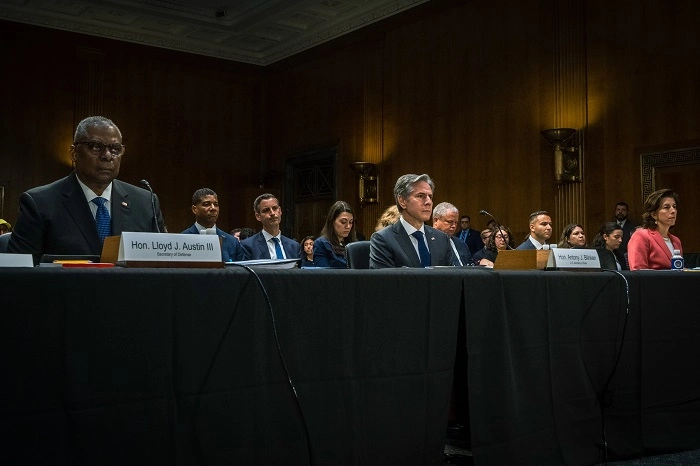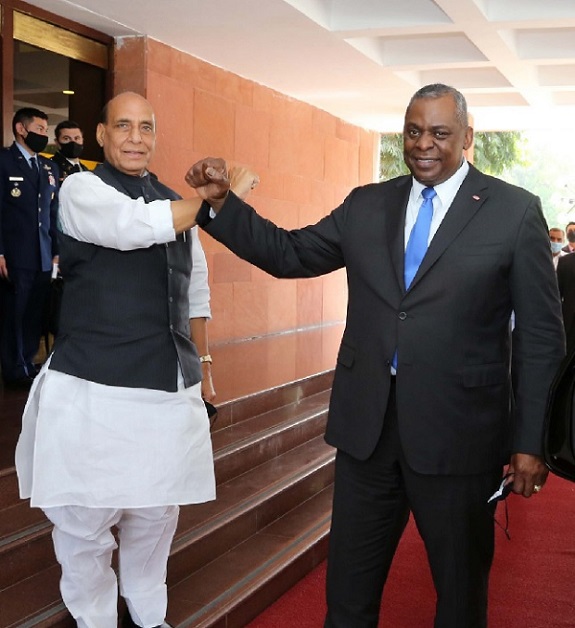The United States continues to expand cooperation with India and other like-minded partners to successfully counter the growing competition with China in the Indo-Pacific Region.
Listing it out as one of the key measures that his department is taking to urgently tackle the “China challenge”, US Defence Secretary Lloyd Austin told members of the Senate Appropriations Committee during testimony Tuesday that the whole Biden administration is working to deepen ties with its network of alliances.
Citing US President’s National Security Strategy, he spotlighted China’s increasing capacity to reshape the international system to suit its autocratic preferences.
“Beijing has increased its bullying and provocations in the Indo-Pacific. It’s embarked upon a historic military buildup, including in space and cyberspace. Of course, war is neither imminent nor inevitable. But we must face up to the PRC’s growing assertiveness,” said Austin.

In a rare joint appearance, the US Secretary of State Antony Blinken and Secretary of Commerce Gina Raimondo also joined Austin at the Senate Appropriations Committee hearing on US President Joe Biden’s budget request for the Pacific Deterrence Initiative (PDI) which is a full 40% higher than last year’s request — an all-time high of $9.1 billion to outpace China.
In order to counter China’s growing aggression in the region, Austin detailed that the US is working with both its rivals and friends to “strengthen the guardrails” against conflict and investing more than ever in a formidable, innovative fighting force and a more resilient force posture in the Indo-Pacific.
Emphasising that most countries in the region share a common vision of an open and inclusive Indo-Pacific free of bullying and coercion, he told the gathering that the US is working with friends around the Indo-Pacific and the world through security cooperation and assistance, and through combined operations and exercises.
“So we’ll continue to strengthen the rules-based international order by making clear the folly of aggression and maintaining open lines of communication.”
Four: The whole administration is working to deepen ties with our network of partners and allies – and we’re seeing that approach deliver major results. pic.twitter.com/mJLWWry6pX
— Secretary of Defense Lloyd J. Austin III (@SecDef) May 16, 2023
The strategy to develop innovative new capabilities and deepen integrated deterrence, said Austin, has “produced historic results” in recent months.
The US is forward-deploying more resilient and mobile assets in Japan, pursuing major new force-posture initiatives with Australia and will have rotational access to four new locations under the Enhanced Defence Cooperation Agreement with the Philippines.
“We’re expanding our security cooperation with South Korea, India, Thailand, Singapore, and many others. We’re deepening our ties with ASEAN and the Quad,” said Austin.
He also revealed that the United States will soon provide “significant additional security assistance” to Taiwan through the Presidential Drawdown Authority that US Congress authorised last year.
“This is part of our longstanding commitment to upholding our obligations under the Taiwan Relations Act and other U.S. policy—and to doing our part to maintain peace and stability in the Taiwan Strait.”
The US Secretary of Defence feared that reducing funding to FY-22 levels across the government would hamstring the US’s ability to compete — even if his Department is exempted from cuts.
“The best way that Congress can ensure our strategic advantage is with an on-time appropriation that supports the President’s budget request,” Austin appealed while concluding his speech.




















